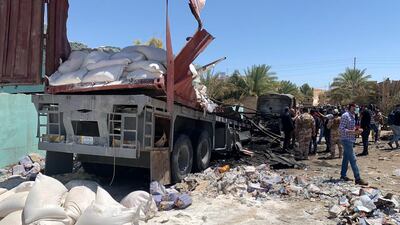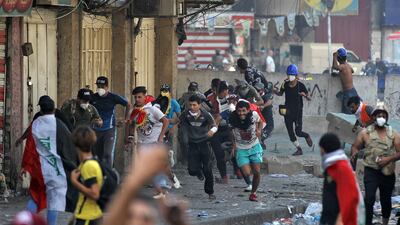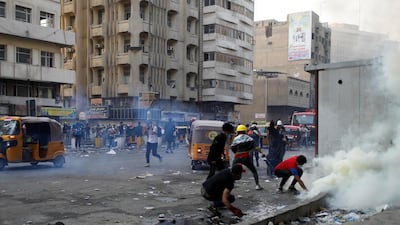Iraqi Prime Minister Mustafa Al Kadhimi’s office raised eyebrows last week when it said that during a meeting in Baghdad, White House Middle East co-ordinator Brett McGurk had committed to withdrawing US troops in a “step-by-step” process.
The reports were swiftly denied by US President Joe Biden’s administration.
Despite the denial, it was reported on Thursday that Iraq and the US will issue a statement calling for US combat troops in Iraq to leave by the end of year after Mr Al Kadhimi meets Mr Biden at the White House next week.
But anyone bracing for an Afghanistan-style US withdrawal from Iraq may not want to hold their breath.
The anticipated announcement is unlikely to significantly alter the US troop presence in Iraq and it seems as though it will largely mirror the joint communique issued in April.
In it, they hinted at the withdrawal of American combat troops “with the timing to be established in coming technical talks".
The Pentagon did not respond to The National’s repeated requests for details on which of the 2,500 US soldiers in Iraq qualify as “combat troops".
“Unfortunately, it’s a tempest in a teapot,” Kenneth Pollack, a resident scholar at the American Enterprise Institute, told The National. “But breaking that teapot could cause a lot of problems.
“They really just want the US to say there are no more combat troops in Iraq. And maybe we have 10 guys get on a plane and come home.”
Mr Al Kadhimi’s visit to the White House will mark his second meeting with a US president in a year.
It is part of the latest round of the US-Iraq strategic dialogue that began under the administration of Donald Trump and the future of the remaining 2,500 US troops in Iraq will feature prominently on the agenda.
The prime minister remains under immense pressure from Iran-backed factions and their powerful paramilitary forces to remove US forces from Iraq before parliamentary elections scheduled for October.
Washington regards Mr Al Kadhimi as a viable security partner and the language in the agreement could give him a symbolic victory to strengthen his hand in coming elections.
“It’s just a matter of using some kind of legal jargon ambiguously,” Randa Slim, a senior fellow at the Middle East Institute, told The National.
“Ambiguous jargon gives Al Kadhimi and the Iraqi government, but especially Al Kadhimi, some leeway ahead of the upcoming elections in October, especially vis-a-vis the Iran-funded militias that have been calling for total US troop withdrawal.”
An Iraqi military delegation arrived at the Pentagon on Thursday before the prime minister’s visit, in part to address the status of US forces.
As a practical matter, the current language on “combat troops” seems drafted to ensure that very few, if any, US soldiers will leave Iraq, because they are there under a mission to advise and assist, rather than for combat.
“There are no real combat forces in Iraq in the way we would traditionally think of them,” Michael Knights, a fellow at the Washington Institute for Near East Policy, told The National. “All this stuff has some sort of a make-believe element to it.”
The Biden administration has continued to press Mr Al Kadhimi to crack down on some of the most hard-line Iran-backed militias.
Joey Hood, the top US diplomat for the Middle East, called on Baghdad last week to “take on those militias” and “bring them to justice” for shooting at thousands of anti-government protesters and assassinating civil activists.
And while an increase in attacks on US soldiers at Iraqi bases in recent months has prompted Mr Biden to launch air strikes on Iran-backed Iraqi militias, the casualties on each side have remained limited.
“They are presently trying not to kill Americans,” Mr Knights said. “If they change their mind, they could kill a bunch of us really easily.
"We’re not trying to kill them, but if we wanted to, we could kill a ton of them. So, it’s like a phoney war really.”
Officially, US troops are in Iraq and Syria as part of a mission to fight the remnants of ISIS while bolstering Iraqi security forces.
Ms Slim said Mr Al Kadhimi must also appeal to Iraqi factions who want the US troop presence to continue, such as Shiite cleric Moqtada Al Sadr’s powerful bloc.
“Al Sadr is for continuing US military assistance and training and intelligence-sharing in the fight against [ISIS[,” she said.
She said the US troops in Iraq are a vital logistical support line for the about 800 American soldiers in Syria, most of whom are supporting the autonomous Syrian Kurdish administration in the north-east.
ISIS aside, many American proponents of keeping US troops in Iraq regard it as a means of countering Iranian influence in the country.
“What they are doing that serves American interests in Iraq is building a strong, independent Iraq,” said Mr Pollack.
“This simultaneously is the best way to defeat ISIS and prevent it from re-establishing a foothold in Iraq. And it is the best way to marginalise the Iranians and reduce and eventually eliminate their influence."
















